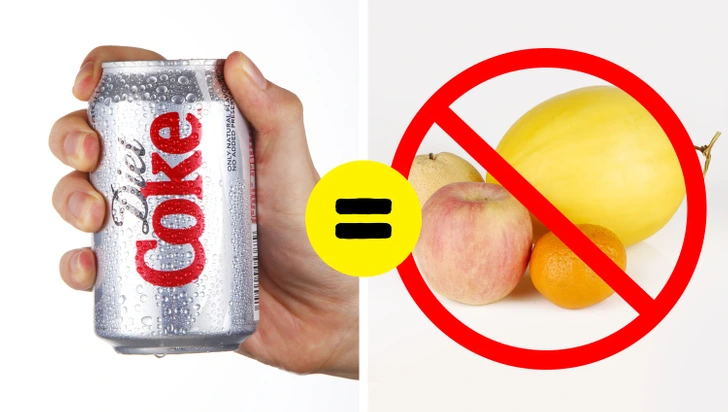Eating wholesome foods, hitting the gym regularly, and catching up on sleep you’ve been deprived of for some reason — all this sound healthy enough, but there’s always a catch when health is concerned. Any of your good habits can turn against you if you don’t know what’s really right for you.
We at Medizenblog brought you some healthy habits that can actually backfire when it comes to your health.
15. Brushing after every meal

According to the Mayo Clinic, if you’ve consumed anything acidic, you should avoid brushing your teeth for at least 30 minutes. Foods containing citric acid, like oranges, grapefruits, and lemons, weaken tooth enamel. Brushing too soon after eating them can damage the enamel in its weakened state.
But it is important to brush your teeth at least twice a day, especially in the evening.
14. Being lured by “healthy” food labels

The claims that cover the labels on foods at supermarkets, like “natural,” “low-carb,” and “healthy” can be pure manipulation. Your savior that’s both relevant and helpful on a label are the ingredients. So while selecting products make sure you focus on the ingredients list instead of the claims.
13. Focusing only on cardio

It’s very important to mix up your exercise routine and not solely focus on cardio. Make sure you don’t retire your weights for running shoes and add in weights or resistance workouts to increase muscle mass, decrease fat mass, and increase strength.
12. Getting extra sleep on weekends 
According to a new study published in the Journal of Clinical Endocrinology and Metabolism, sleeping a few extra hours on the weekend is actually bad and can lead to health problems in the long run. So instead of catching up on the weekday sleep deficit, aim for at least 7 to 9 hours of sleep every night.
11. Thinking being health conscious means social isolation 
Healthy eating means getting enough of every important nutrient and avoiding excessive fat, sugar, salt. But it does not mean that you start avoiding outings with your friends and family. This starts when you unconsciously start canceling all social events, so you can keep sticking to your “healthy diet.”
To avoid this, you can plan and make your diet chart in a way that you can still enjoy your social life.
10. Skipping lunch

It’s very common to skip lunch if you’re trying to lose weight or cut calories, but that strategy rarely works. According to the Weight Control Information Network, people who tend to skip meals regularly weigh more than people who eat often throughout the day. Skipping lunch can rev up your appetite later, causing you to overeat or choose foods that have poor nutritional value.
9. Drinking a protein shake after your workout

It’s true that protein after a workout may contribute to muscle growth and reduce soreness but if you work out after work or at night, then make the protein shake your dinner or you may risk overeating. Also, some lower-intensity workouts may not require an increase in protein. Unless you’re a really serious bodybuilder, you’re probably doing your waistline more harm than good.
8. Weighing yourself every day

If you weigh yourself every single day while you’re on a diet, you will likely feel frustrated by not seeing any immediate progress. Additionally, you might feel like you have to start cutting your meals even more or get so upset that you give up the whole healthy eating thing altogether. Well, don’t do either. Just stop weighing yourself every day and you’ll see the results of your diet soon enough.
There’s also a trick to feel more content with yourself and your food: eat slowly. Our brain takes its time to register that the stomach is full. If you munch too fast, you don’t feel full until you suddenly realize you’ve overeaten. Spend at least 20 minutes chewing and swallowing your meals and you’ll need much less food to feel satisfied.
7. Peeling apples 
One medium (3-inch diameter) unpeeled apple has nearly double the fiber, 25% more potassium, and 40% more vitamin A than a peeled apple. Almost 100% of an apple’s quercetin (an antioxidant that supports heart health) is in the peel.
6. Drinking diet soda 
Diet soda seems like a health-conscious choice but there’s more to this chemical cocktail than meets the eye. Artificial sweeteners have a more intense flavor than real sugar, so over time products like diet soda dull our senses to naturally sweet foods like fruit. Also, they could lead to weight gain and not weight loss.
5. Eating turkey bacon instead of regular bacon 
Turkey bacon is a processed meat. It is the only kind of meat the American Institute for Cancer Research recommends avoiding completely, as it delivers zero grams of fiber. We’re supposed to get 30 grams of fiber a day, and the average American gets only 14 grams.
4. Avoiding sun
Having too much sun can cause sunburns, but not having sun can cause serious diseases and also lead to a lack of vitamin D. According to Pelle Lindqvist, MD and his colleagues of Karolinska University Hospital in Huddinge, Sweden, it’s been found that women who seek out the sun were generally at lower risk for cardiovascular disease (CVD) and non-cancer/non-CVD diseases, like diabetes, multiple sclerosis, and pulmonary diseases, than those who avoided sun exposure.
3. Excessive training at the gym 
Working out regularly is beneficial for your health, but an excess of anything is bad. Overtraining can leave less time for your muscles to repair, can cause sleep trouble, and for girls, it can also mess with your menstrual cycle. Take at least 1 or 2 days of rest.
2. Microwaving diet food 
The convenience a microwave oven offers is undeniable. But cooking food with microwaves makes food less healthy by zapping its nutrients. Most of the frozen food has sodium in it and with pre-prepared microwavable meals other concerns are also their lacks veggies and calorie count.
1. Drinking bottled water 
According to the Natural Resources Defense Council, samples of 1000 different brands of bottled water contained bacteria or chemicals in levels that were considered unsafe because they might cause cancer or other illnesses. So instead opt for filtered water or purified tap water.
We hope that you’ll now erase these unhealthy habits from your routine. We’d love to hear your views. Please share your thoughts in the comments below.


